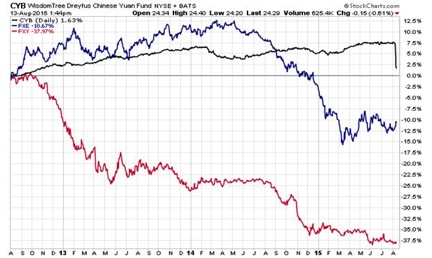The Truth about Currency Manipulators
The big news rocking global markets early this week was China and its surprise move to devalue its currency not once, but twice in two days.
Although markets have largely settled down during the past couple of trading days, the early-week selling in both domestic and international markets was a direct result of the near-5% plunge in the value of the Chinese yuan.
The theory here is that China is manipulating its currency to juice exports and lift its flailing economy. While this may indeed be true, China is not the only country doing this.
In fact, one look at the chart here of the Chinese yuan (CYB), the euro (FXE) and the Japanese yen (FXY) clearly shows that the leading global manipulator is Japan.
Still, the Chinese move to devalue the yuan has brought up a lot of questions regarding what this means for stocks all over the world.
First, there’s a lot of nervousness about China’s economic growth, as well as that country’s ability to continue its 7% annual gross domestic product (GDP) expansion. Given that China is a major growth engine for the entire global economy, this is understandably a legitimate concern.
Second, the move has many worried about the beginning of a currency war, where central banks around the globe race to the bottom and try to make their currency relatively cheaper vs. other currencies, particularly the dollar.
Given that the Fed is likely to hike interest rates at least once this year, the move now to devalue currencies may be a preemptive strike against a rate hike that is dollar bullish.
Finally, the very sloppy interventions of late in both the currency and stock market by Chinese policymakers have many questioning China’s ability to control these respective aspects of their economy. This narrative is likely the biggest factor influencing global sentiment right now.
In today’s Weekly ETF Report video, I show you several more charts on the yuan, the euro and the yen, and we see how the recent currency tumult has influenced stocks in the S&P 500 and in the major global indices.
So, how will all of this currency manipulation turn out?
It is a grand experiment that has little precedent. As such, you need to be ultra cautious when it comes to putting money to work in either domestic or international equities.
In fact, right now subscribers to my Successful ETF Investing newsletter are sitting calmly, waiting for the turmoil in the currency, commodity and stock markets to settle before getting placing any big bets on this market.
To find out when it’s time to jump back into the pool, check out Successful ETF Investing today!



